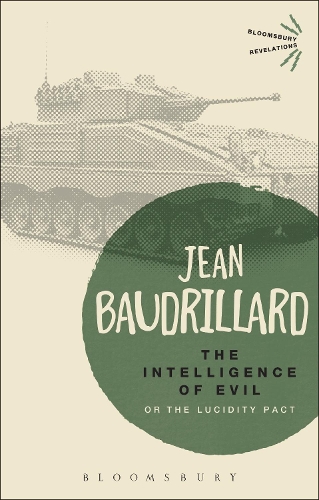
The Intelligence of Evil: or, The Lucidity Pact
(Paperback)
Available Formats
Publishing Details
The Intelligence of Evil: or, The Lucidity Pact
By (Author) Jean Baudrillard
Bloomsbury Publishing PLC
Bloomsbury Academic
25th April 2013
United Kingdom
Classifications
Tertiary Education
Non Fiction
Western philosophy from c 1800
194
Physical Properties
Paperback
176
Width 137mm, Height 213mm, Spine 10mm
237g
Description
In the wake of the 9/11 attacks, after the invasions of Afghanistan and Iraq and at the height of the "War on Terror", the controversial postmodernist thinker Jean Baudrillard wrote The Intelligence of Evil. In tackling the rhetoric of the so-called "clash of civilizations" between a capitalist West and a fundamentalist religious Islam, the book also provides a summation of many of the most important themes of Baurdrillard's philosophical project. Baudrillard here explores how neoliberal political rhetoric has divided human cultures are divided into two antagonistic forces, one based on symbolic exchange, which is dual and reciprocal, and one based on money and sign exchange, which is totalising. Non-western societies can create genuinely symbolic, durable cultures. But the western world-system, based on a logic of empire, is designed to create an integrated and sealed reality, to snap tight around the world and its image. If the first is indestructible and the second is irresistible, who can win and what will victory look like
Reviews
The Intelligence of Evil presents us with a fascinating mental journey outside of what we have come to call reality, and makes us question the fundamental dichotomy between what is good and what is evil. It is highly recommendable for people with an interest in philosophy, or a lot of time on their hands. -- Johanna Frst * Journal for Intelligence, Propaganda and Security Studies *
one of Baudrillards last, and arguably best, books The Intelligence of Evil is perhaps Baudrillards most rigorous and certainly one of his more complex works. -- Jonathan Fardy * Foucault Studies *
Author Bio
Jean Baudrillard (1929-2007) was one of the most influential and controversial thinkers of the post-War period. Perhaps the leading thinker of the postmodernist school, his writings cover art, media, sociology, culture and philosophy.
